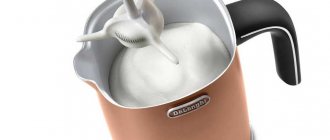Photo: opttab.ru Is coffee healthy or not? This drink is so loved and revered that few people think about how it affects the body. Scientists still cannot come to a consensus and give a concrete answer about the dangers and benefits of coffee for health.
- Coffee with milk (with cream)
Coffee composition
Chemical composition of natural coffee beans
The composition of coffee beans is very complex. It is influenced by many factors:
- climate;
- the soil;
- variety;
- storage conditions for the harvested crop.
Some sources claim that raw beans contain about 800 substances, and roasted ones contain over a thousand.
And yet the main cast remains unchanged. It can only vary in percentage.
- Squirrels. There are not very many of them - only 9-10%, the main one is amine nitrogen, which is part of many amino acids.
- Carbohydrates. Make up 50-60%. These are mainly sucrose and cellulose. In addition to them, there is also lignin, high molecular weight polysaccharides (fiber, arabinogalactan), reducing saccharides (fructose and glucose) and pectin carbohydrates.
- Caffeine. The substance belongs to the purine alkaloids. It gives the drink a bitter taste, the severity of which depends on the amount of this substance. Its amount in coffee depends on the variety. Caffeine stimulates the central nervous system, increasing heart rate and blood pressure. It also constricts blood vessels in all organs except the kidneys, which, against the background of improved blood supply, begin to work more actively. That's why after drinking a cup of coffee, about half an hour later, many people want to go to the restroom.
Structural formula of caffeine. Photo: amdipt.dk
- Tannin. Water-soluble polyphenol. Has astringent properties. After the beans are roasted, most of this substance disintegrates, giving the drink its characteristic taste and aroma.
Structural formula of Tannin. Photo: yandex.ru
- Theobromine and theophylline. Alkaloids, caffeine antagonists. They have diuretic properties and dilate blood vessels in the body, thereby lowering blood pressure.
Structural formulas of caffeine, theophylline, theobromine. Photo: yandex.ru
- Chlorogenic acids (quinic, cinnamic, ferulic, caffeic). Stimulates the pancreas and the secretion of gastric juice.
Structural formula of Chlorogenic acid. Photo: yandex.ru
- Vitamins (B1, B2, B3), macro- and microelements (calcium, magnesium, sodium, iron, phosphorus, potassium and copper).
Chemical composition of instant coffee
The basis of the powder is proteins and carbohydrates. However, the composition is completely different. Almost all manufacturers add flavorings, flavor enhancers and other synthetic compounds. The exception is organic instant coffee, which is produced by drying coffee extract. It contains a slightly higher proportion of natural ingredients.
This is interesting! Often a cup of instant coffee does not invigorate, but, on the contrary, puts you to sleep. The thing is that the powder from which the drink is prepared contains little caffeine, but it is rich in theobromine. The reason is very simple: instant coffee is made from the inner shell of the coffee bean, which contains this substance. And there is practically no caffeine in it.
The structure of coffee beans. Photo: taberacoffee.ru
Violation 3: Poor marking
What makes the situation worse is that, according to Nuchi, you know absolutely nothing about the origin of the coffee or the date it was roasted or ground. Therefore, it becomes almost impossible to find out how fresh and high-quality the product you received is.
I asked Keurig's outreach team about what beans they use and where they come from, and they again refused to answer.
A Keurig representative, who did not want to be named, said even Keurig employees don't know when a particular batch of coffee was roasted and ground. Each box only has an expiration date on it, which is the only way to ensure freshness (which doesn't really say much).
According to Nuchi, coffee can sit in a sealed K-Cup for months or even years before the capsule reaches your hands. And the complete lack of information about the origin of coffee beans makes it impossible to draw any conclusions about its quality.
“I believe that the less transparent their packaging, the lower the quality of their contents,” says Nuchi. “What’s remarkable about the coffee industry is that producers take pride in the origin of the beans and when they were roasted.” The absence of this fact from Keurig can only indicate the mediocre quality of the product.
When not to drink coffee
A natural drink can have an irritating effect on the gastric mucosa and negatively affect the functioning of the cardiovascular system. Therefore, the main contraindications for drinking coffee, including with additives, are:
- diseases of the digestive system (chronic gastritis, gastric and duodenal ulcers, pancreatitis, irritable bowel syndrome, Crohn's disease, ulcerative colitis and other pathologies that are accompanied by a violation of the integrity of the mucous membrane);
- diseases of the cardiovascular system (heart failure, arrhythmias, hypertension, coronary heart disease and atherosclerosis).
Tannins contained in coffee have a positive effect on the absorption of vitamins, but can interfere with the absorption of microelements, especially iron. Therefore, people with anemia are not recommended to drink the drink without adding milk, which neutralizes them.
Coffee with milk is difficult to digest
The chemical reaction that occurs between casein and tannins has another negative effect. It makes the proteins contained in milk difficult to digest. This product takes longer to be broken down by gastric juice and can make you feel worse.
Coffee beans LavAzza “Qualita Oro”, 500 g 752 rub.
Lavazza “Qualita Oro” coffee beans, 250 g 351 rub.
Ground coffee in instant Nescafe “Gold”, 750 g -25%
745 rub. 993 rub.
Compagnia Dell'arabica "Jamaica Blue Mountain" bean coffee, 1500 g 48,960 rub.
Ground coffee Lebo “Extra”, for Turkish, 75 g 61 rub.
Coffee capsules Coffesso “Coffee set”, assorted for Nespresso coffee machine, 50 capsules -25%
961 rub. 1281 rub.
Coffee beans Paretto “Celesto”, freshly roasted, 1000 g 1619 rub.
Instant coffee Ambassador “Platinum”, 95 g 230 rub.
Choose coffee on TEA.ru
In addition, milk contains lactose (also known as “milk sugar”), a carbohydrate from the disaccharide group. The percentage of people with lactose intolerance (more precisely, low levels of the lactase enzyme) in different countries is very high: from 1–2% (Scandinavian countries) to 90–100% (SEA). Among the Eastern Slavs, lactose intolerance affects, according to research by medical anthropologist Andrei Kozlov, from 36 to 80% of the population, depending on the region of residence.
Consequences of drinking coffee
- Coffee is especially harmful to the stomach if you drink it on an empty stomach and without milk. And this often happens when a person is in a hurry to go to work in the morning and does not have breakfast as he should. Over time, this habit will definitely affect the condition of the mucous membrane. Its constant irritation can provoke the development of gastritis and peptic ulcers.
- Coffee has no less negative effects on the kidneys. Caffeine dilates renal blood vessels. It reduces the reabsorption of water and the electrolytes it contains from the renal tubules into the bloodstream. Excessive coffee consumption leads to an imbalance of water and electrolyte balance, and the leaching of potassium from the body when drinking coffee will primarily affect the heart and blood vessels.
- Coffee is good for the liver. It stimulates the production of bile, thereby improving the quality of digestion. The grains contain substances involved in lipid metabolism, which reduces the risk of developing hepatosis - fatty liver degeneration.
- Coffee and the pancreas are a powerful tandem in the prevention of diabetes. Studies have shown that caffeine stimulates the synthesis of adrenaline, which in turn accelerates the production of insulin. However, there is also a flip side to the coin - regular use of large doses can lead to depletion of pancreatic cells.
Coffee improves athletic performance
Now we come to the health benefits of coffee, some of which may surprise you. Do you have some acquired subcutaneous fat that somehow appeared in your 30s? Can your stomach move spontaneously when you dance in the shower? Enough
In fact, almost all “fat burning” medications contain caffeine. This chemical, found in coffee, increases your metabolism and causes you to consume fat faster. This occurs by directly breaking down fat molecules, which simultaneously stimulates the body to release adrenaline - coffee can improve the performance of certain sports exercises by more than 10%.
Caffeine is prohibited for professional athletes. If you drank a cup of coffee before you went to the gym to lift heavy weights or do aerobics, you'll likely lose a lot of fat while building muscle. Just remember, coffee is a weak diuretic: it makes you go to the toilet more often than usual. Keep drinking water and doing your exercise routine, and a little coffee will help you achieve the body of your dreams.
If you ask an Italian where the best coffee is, he will almost certainly say Italy, while gesticulating furiously. Café Greco opened in 1760 and is therefore the oldest coffee shop in Rome. His admirers included Keats, Gogol, Shelley and Byron; Hans Christian Andersen lived for some time in the apartment above the establishment.
Harm of coffee for men and women
The drink can bring not only pleasure, but also problems.
Harm of coffee for men
In addition to the general negative aspects, excessive consumption of the drink can negatively affect potency. This is due to the fact that coffee contains active substances that are similar in structure to estrogens. And the more coffee a man drinks, the higher their level will be in his body. And they are testosterone antagonists, which will result in a decrease in male libido.
Harm of coffee for women
You should drink it especially carefully during menopause, as it increases the risk of developing osteoporosis. In addition, excess estrogen also negatively affects the female body, as well as the male one. In particular, this leads to thinning of the endometrium in the uterus and subsequent problems with implantation of the fertilized egg.
Coffee Can Help Supplement Your Diet
Although a cup of coffee contains only 2.4 calories (assuming you don't load it up with cream and sugar), it provides significant amounts of nutrients such as pantothenic acid, manganese, potassium, niacin and riboflavin. What does all of this mean?
Most doctors will tell you to get most of your nutrients from fruits and vegetables, but one group of researchers has found that coffee is actually the largest source of antioxidants. Tea was in second place. Together with certain nutrients and microelements, a few cups of coffee can help you get your daily amount of antioxidants.
Is it possible for pregnant women to drink coffee?
All doctors are surprisingly unanimous on this issue. During the period of bearing a child, they advise completely abandoning the aromatic drink. After all, all the beneficial properties of coffee in this case turn into disadvantages:
- the invigorating effect can cause tachycardia, lead to sleep disturbances and nervousness, and this is absolutely useless, because while carrying a child, a woman’s body is already under increased stress;
- in the early stages of pregnancy, the tonic property can play a cruel joke, toning the uterus, which can lead to miscarriage;
- no less dangerous is the diuretic effect, due to which calcium and other minerals necessary for the full formation of the fetus will be washed out of the woman’s body;
- Vasospasm provoked by coffee will worsen blood circulation in the placenta, and this will disrupt the supply of oxygen and nutrients, which can result in hypoxia and, over time, fetal malnutrition.
Instant coffee is also not advisable during pregnancy, like natural coffee. A woman’s body does not need harmful additives contained in it.
Are you healthy? There may also be contraindications
So, coffee has contraindications; Those who are not allowed to drink usually know about medical recommendations and try to follow them. But sometimes a person without health problems does not tolerate coffee well. If after taking it you experience weakness, tachycardia, abnormal bowel movements, or irritability, it means that you are hypersensitive to caffeine, and it may be unsafe.
At certain periods of life, even avid coffee drinkers are better off giving up their favorite drink.
Pregnancy
Caffeine easily crosses the feto-placental barrier and affects the fetus. Drinking more than 3 cups per day poses a risk of premature birth, miscarriages, and low birth weight babies. It is better for the expectant mother to exclude the tonic drink from her diet completely, so as not to risk the life and health of the fetus.
Lactation
Caffeine passes into breast milk and causes increased excitability in the baby. Sleep is disturbed, the child becomes nervous and tearful. Moreover, up to three months of age, it will take up to 4 days to completely remove the tonic substance from the body!
Who can drink coffee and who can’t depends on the age of the child. After 6 months, it is permissible to drink 1 cup of mild drink per day if the child does not have a tendency to allergies.
Elderly age
After 50 years, the amount of calcium in the bones decreases significantly, so older people are more likely to suffer fractures. And caffeine interferes with the absorption of this essential microelement from food, so the situation may worsen. When a pensioner is diagnosed with osteoporosis, you should forget about coffee.
Can children have coffee?
Doctors here are unanimous in their answer - only children of high school age - from 14-16 years old - can drink natural grain coffee. It is not recommended to give it earlier, and the reasons for this are quite understandable. The harm of coffee for children of primary and school age is obvious.
The main active ingredient of the drink is caffeine. It has a pronounced effect on the nervous system. In young children, she is still fragile, so even without him she experiences excessive stress every day. In adolescence, stress from hormonal changes is added to them, and drinking coffee will only aggravate the situation, forcing the nervous system and internal organs to work to the limit of their capabilities.
Signs of coffee addiction
Often, coffee lovers do not even suspect that they are becoming addicted to their favorite drink. If the body gets used to constant artificial stimulation, it ceases to respond properly to the alkaloid. At the same time, a number of characteristic changes are noted. You can determine whether you have a caffeine addiction by the following symptoms:
If you don't drink coffee, your head starts to hurt
Caffeine is a compound that helps increase heart rate and activate the central nervous system. This alkaloid provokes the synthesis of adrenaline. When it penetrates the body, blood flow becomes accelerated and blood pressure rises.
If suddenly there is no caffeine in the body, a caffeine-dependent headache appears. For example, if a person drinks 5 servings of espresso every day, but suddenly skips another coffee serving, he begins to experience similar symptoms.
Doctors call this phenomenon withdrawal syndrome. When a coffee drinker stops drinking an invigorating drink, instead of lightness, he experiences a headache. Weaning off the effects of caffeine is a painful and lengthy process. Doctors sometimes even call this condition a mental disorder.
The appearance of swelling
Caffeine leads to dehydration. The skin ages faster and swelling on the face begins to appear. If sugar, milk or syrup is added to the drink, its glycemic index increases. There is a jump in blood glucose levels and the formation of cortisol. Due to the intense release of insulin, you begin to crave sweets.
Problems with concentration
Once in the intestine, the natural alkaloid is almost completely absorbed. This takes approximately 45 minutes. The maximum concentration of caffeine in the blood is observed just a quarter of an hour after it enters the body.
If a person drinks espresso regularly, this effect becomes weaker. We have to increase the number of servings, but these actions are in vain. Caffeine no longer helps me concentrate.
Feelings of anxiety
Under the influence of caffeine, the excitability of the cardiovascular and respiratory systems and the spinal cord increases. The pressure rises and the heart begins to work harder. Changes occur in the blood vessels, the central nervous system is excited and the pulse quickens. As a result, avid coffee drinkers develop a feeling of anxiety and restlessness.
There is no desire to give up coffee
If a person cannot imagine even a day without coffee drinks, this is a clear sign of addiction. You need to start thinking rationally and reducing the number of servings. Moreover, you should not replace regular espresso with a decaffeinated drink. It also has a lot of side effects. In addition, it also contains caffeine. True, in very small quantities.
What is the best time to drink natural coffee?
Coffee lovers are ready to drink it almost around the clock. However, experts have their own opinion. The best time when the drink will bring not only pleasure, but also benefit is to drink coffee in the morning. And yet, when you wake up, you shouldn’t immediately run to the kitchen. Let 1-2 hours pass after waking up.
It's all because of cortisol. This “stress hormone” is produced at 8-9 am, after which its synthesis weakens somewhat. It forms protective reactions - increases heart rate, increases blood pressure, and keeps blood vessels toned. But coffee has the same properties! Then why does the body need extra stress? It’s better to really wait and drink a cup of aromatic drink after 10 am, when the level of the “stress hormone” decreases somewhat.
Effect on the nervous system
The beneficial properties of the drink in regulating the functioning of the nervous system have been scientifically proven:
- Drinking coffee daily in the morning can tone up the brain,
its benefits include enhancing concentration, increasing stress resistance and performance; - The benefit of the drink is that strong black coffee is an antidepressant
- it contains serotonin, which is beneficial for well-being; - Brewed ground coffee can relieve headaches .
What are the harms of coffee?
- The harm of the drink to the nervous system is explained by the fact that boiled coffee causes an addictive effect,
similar to nicotine and alcohol addiction; - The harmful effect also lies in the fact that in case of overdose, coffee causes aggression and increased irritability;
- The harm of coffee before bed is also explained by the possible occurrence of long-term insomnia.











